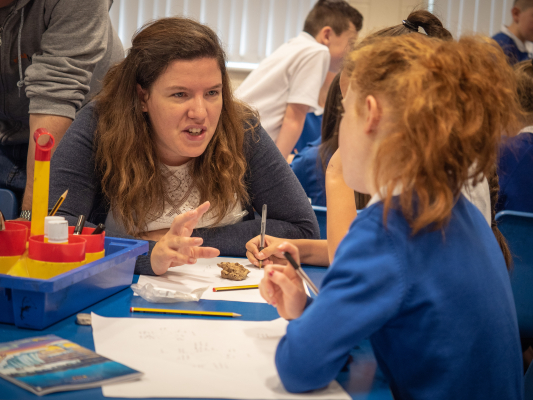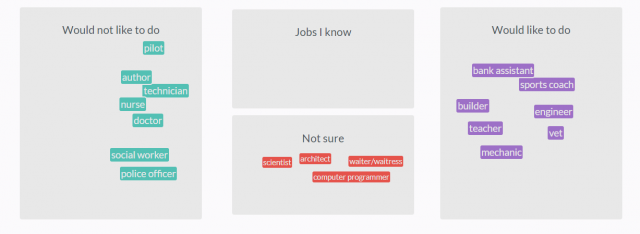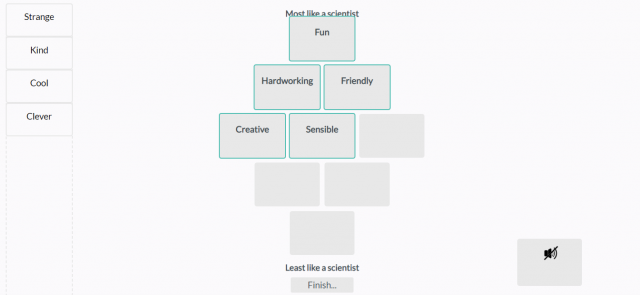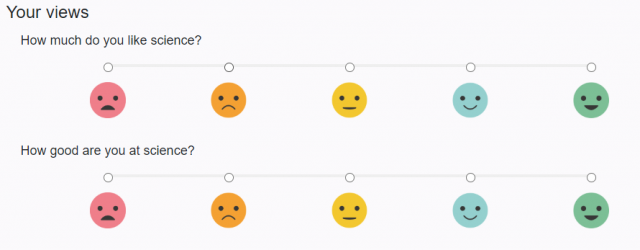NUSTEM’s 5 Year Impact Study: Primary Schools
2014 – 2019 Findings
2014 – 2019 Findings
NUSTEM has evaluated the long-term impact of sustained engagements with partner primary schools during our first 5 years of operation, 2014 – 2019.
Our research study in primary schools measured children’s interest and self-efficacy in science, perceptions of scientists, and aspirations for STEM jobs.

Our study has shown:
From our 5-year study NUSTEM makes the following recommendations to help increase in the diversity of STEM.
In 2015 we collected baseline data from children in Years 3 and 5 in six primary partner-schools (research schools). We collected repeat data from children in the same year groups and schools in 2017 and 2019. Data analysed was collected from 308 pupils in 2015, 312 pupils in 2017 and 254 pupils in 2019.
Data were collected using specially designed research tools for younger children including a simple Science and You questionnaire (collecting demographic data and data on children’s enjoyment of science and self-efficacy in science), Most Like Me/Most Like a Scientist sorting game (collecting data on children’s perceptions of self alongside their perceptions of scientists) and the STEMKat sorting game (collecting data on children’s knowledge of, and aspirations, for STEM jobs).
The Year 5 cohort in 2015 who had received no intervention at the time of data collection was used as a comparison group for the two Year 5 cohorts in 2017 and 2019 who had participated in 2+ years of NUSTEM activities.
Data were coded and analysed using the statistical analysis software SPSS. Chi Square and Fishers Exact tests were used to determine whether there were statistically significant relationships between the comparison groups. Significance is reported where the p value is less than 0.5.
NUSTEM’s approach to STEM engagement is strongly linked to careers. Most interactions with children, and their families, link science (and STEM) topics with a related career. In nursery and reception young children can ‘try out’ different STEM careers using loans boxes, for older children classroom-based workshops introduce the characteristics of people working in different STEM careers, whilst resources such as the ‘Primary Careers Tool’ make it easy for teachers to include STEM careers within each science or maths lesson.
The research study finds evidence the NUSTEM intervention had broadened primary school children’s aspirations for STEM jobs, especially in engineering and the physical sciences, and particularly amongst girls. Compared with the baseline cohort, children in schools which had received 2 or more years of NUSTEM intervention were more likely to consider:
Our baseline data in 2015 showed that more boys had aspirations for STEM jobs than girls and they were more focused on physical sciences and technology careers. Girls with STEM aspirations were more inclined towards health and life sciences jobs. The 2019 data, shows this is still largely still the case, with statistically significant differences between the genders aspirations for many STEM Jobs. However, the gap between the gender’s aspirations for some STEM jobs (engineer, game tester and technician) has reduced.
We collected data using our ‘STEM Knowledge and Aspiration Tool’ (STEMKat). STEMKat asks children to sort a list of 30 jobs. Children first sort the jobs into those that are ‘known’ or ‘not known’. The jobs the children know are then sorted into those they would like to do, would not like to do, or aren’t sure about. The 30 jobs included in the STEMKat tool are a broad mix of STEM and non-STEM jobs.

The STEM jobs included in STEMKat were: astronaut, banker, doctor, engineer, farmer, game tester, mechanic, nurse, pilot, surveyor, technician, vet, zoologist.
Children can have stereotypical perceptions of scientists and engineers, and so NUSTEM resources challenge these stereotypes and introduce positive attributes to describe scientists and engineers. We achieve this by using diverse role-models and examples within our school outreach, and through specific targeted interventions such as STEM Person of the Week.
The research finds evidence that in partner primary schools which had received 2 or more years of NUSTEM interventions girls perceptions of scientists have changed, particularly in reducing the perception that scientists need to be ‘very clever’. Girls were:
In each case changes in boys’ attitudes was not statistically significant.
In 2015 our baseline data show that most children believed scientists to be hardworking (70%), clever (68%), hardworking and creative (48%).
In 2019 sensible (57%) replaced creative, with hardworking (74%) and clever (58%) still the most common characteristics.
In 2015 we found that more girls reported a perception of scientists as clever than boys (boys:62%, girls:73%). In the 2019 data this is reversed with more boys reporting the perception that scientists are clever than girls (boys:68%, girls:48%). This change is attributed a reduction in the perception among girls (-25%), while boys perceptions have largely stayed the same.
Our research tool ‘Most Like a Scientist’ asked children to rank nine attributes into a ‘diamond nine formation’ to identify attributes they thought were most like, and least like, a scientist.
The nine attributes were clever, cool, creative, friendly, fun, hardworking, kind, sensible and strange.

NUSTEM works to foster childrens’ natural interests in science and engineering, and enable them explore STEM topics and work scientifically with confidence.
However our research shows that despite NUSTEM’s intervention children’s enjoyment of science and belief in their science ability declined slightly during the 5 years. Children who has 2 or more years of intervention were:
Our ‘science and you’ worksheet asked children to respond to the statements ‘I like science’ and ‘I am good at science’ on a 5-point Likert scale.

If you to know more about NUSTEM’s research activities, we have produced a report which explores how the NUSTEM Theory of Change allows us to evaluate the impact that our activities have had in a range of areas: NUSTEM Impact Report 2014 – 2020.
You may also like to take a look at our research publications on our Publications and Dissemination page.
We may request cookies to be set on your device. We use cookies to let us know when you visit our websites, how you interact with us, to enrich your user experience, and to customize your relationship with our website.
Click on the different category headings to find out more. You can also change some of your preferences. Note that blocking some types of cookies may impact your experience on our websites and the services we are able to offer.
These cookies are strictly necessary to provide you with services available through our website and to use some of its features.
Because these cookies are strictly necessary to deliver the website, refusing them will have impact how our site functions. You always can block or delete cookies by changing your browser settings and force blocking all cookies on this website. But this will always prompt you to accept/refuse cookies when revisiting our site.
We fully respect if you want to refuse cookies but to avoid asking you again and again kindly allow us to store a cookie for that. You are free to opt out any time or opt in for other cookies to get a better experience. If you refuse cookies we will remove all set cookies in our domain.
We provide you with a list of stored cookies on your computer in our domain so you can check what we stored. Due to security reasons we are not able to show or modify cookies from other domains. You can check these in your browser security settings.
These cookies collect information that is used either in aggregate form to help us understand how our website is being used or how effective our marketing campaigns are, or to help us customize our website and application for you in order to enhance your experience.
If you do not want that we track your visit to our site you can disable tracking in your browser here:
We also use different external services like Google Webfonts, Google Maps, and external Video providers. Since these providers may collect personal data like your IP address we allow you to block them here. Please be aware that this might heavily reduce the functionality and appearance of our site. Changes will take effect once you reload the page.
Google Webfont Settings:
Google Map Settings:
Google reCaptcha Settings:
Vimeo and Youtube video embeds:
The following cookies are also needed - You can choose if you want to allow them:
You can read about our cookies and privacy settings in detail on our Privacy Policy Page.
Privacy Notice and Cookies 2025